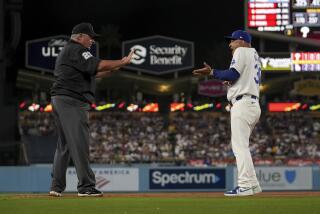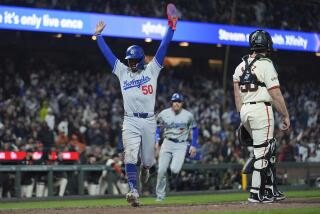When Kerfeld Took a Seat, the Astros’ Game Went Ker-Plunk
- Share via
NEW YORK — The imagination was still working, even if Charlie Kerfeld was not, so it was easy to picture the dear hearts and gentle people of Knob Noster, Mo., good-time Charlie’s hometown (Pop. 2,040), sitting forward on their sofas and shouting at their television sets: “Leave him in! Leave him in!”
A baseball game was being broadcast coast-to-coast on a Saturday afternoon, live from New York, just like the days when there were no such teams as the New York Mets or the Houston Astros, a time when the townspeople of Knob Noster might have huddled on the sidewalk outside the local appliance store to watch the ballgame on the TVs in the window.
Now, back to the future, here they were, watching their favorite son, all 6 feet 6 inches and 245 pounds of him, playful as a sheepdog puppy, playing ball in New York. He had that same happy-go-lucky manner with which everyone back home was so familiar, that Gary Busey-style farmboy look and sound, and he peered through tinted glasses while he pitched. No one would have been amazed if, under Kerfeld’s Astros cap, he had worn a headband reading: UEBERROTH .
It was the eighth inning of a suspenseful game at Shea Stadium, the Game 3 tiebreaker of the National League championship series, and Kerfeld’s job was to protect Houston’s 5-4 lead. He had just turned 24 years old a couple of weeks before and was only a rookie, but the novice from Knob Noster was cool.
He proved that the instant the first Met batter he faced, Gary Carter, knocked one of his pitches right back at him. Kerfeld curled his gloved left hand behind his back and caught Carter’s grounder with a blind stab. As Carter stopped dead in his tracks, in astonishment, Kerfeld tossed him out at first, then wagged a finger at him as if to say: “Gotcha.”
It was in the Astro clubhouse after the game that Kerfeld said: “Back home, we call that one the Scoop de Loop. You just stick your hand behind you and hope it lands in your glove. It’s one in a million, boy. I don’t know if I was pointin’ at Gary or what. At the time, I think we were both just standin’ there having heart attacks.”
Had he ever made such a stab before?
“Naw, I usually take ‘em off the shinbone,” Charlie said.
Next, Kerfled worked on Darryl Strawberry, who had crushed a three-run homer last time up. Kerfeld struck him out, no sweat. Then Ray Knight went out on a routine fly to right, and Kerfeld happily hopscotched back to the dugout.
He already knew what the folks back home might not have suspected: That his work was over. When the ninth inning came, the Astros would replace him with Dave Smith, the platinum-haired California beach boy with whom Kerfeld had absolutely nothing in common, except for a partnership in saving games. Smith had made 33 saves for the National League West champions during the season, many of them after Kerfeld had toiled through the eighth inning, holding the fort.
It was during this time that the world at large began to discover the lovable lug from Knob Noster, the Astro who loved Jetsons cartoons and wore goofy T-shirts under his uniform (“Jetsons Invade New York,” read one) and grabbed the league lead in malapropisms with a beauty, the one where he called title-bound Houston “a team of destination.”
Kerfeld would use the English language creatively again Saturday at Shea Stadium, under unhappier circumstances.
When Smith was summoned to save the game, there was no thought on Houston Manager Hal Lanier’s part that perhaps Kerfeld should have kept on pitching. Lanier knew others would wonder about that, though, which is why he told reporters later: “It’s easy for you to sit out there and say I should have left Kerfeld in, but there’s no reason not to bring in your No. 1 man. If you get beat by your No. 2 man, you would really have something to write about.”
Kerfeld needed no convincing. “Dave Smith didn’t get 33 saves usin’ mirrors,” he said.
But on this day, Smith would get no save at all. Wally Backman of the Mets would reach base safely against him on a freaky play, as freaky as the Scoop de Loop, in the ninth inning. Backman bunted, then dodged Smith’s tag by running wide of the baseline--possibly too wide.
The umpire’s decision that Backman had not crossed illegal boundaries brought out the Norm Crosby once again in Kerfeld.
“It was a call that kind of beneficiaried them,” he said.
What it did was make Lenny Dykstra’s home run, one out later, a two-run game-winner rather than a solo shot to tie the score. The Mets had a 6-5 victory, and the Astros had a bad case of shell-shock. Their locker room was as quiet as a library.
Smith sat in front of his stall and took on all comers. “This has got to be the worst feeling I’ve ever had in a uniform,” was among the first of his emotions that spilled forth. Endlessly, he repeated how the forkball he served Dykstra had strayed too far across the heart of the plate, how if he had it to do all over again it would be a fastball instead, how it wasn’t a bad pitch so much as “bad pitch selection.”
Alan Ashby, the catcher, disagreed. “It was Smith’s best pitch all year. Dykstra just happened to hit it,” Ashby said.
The irony in Smith’s eyes was that the Mets had beaten him just as Houston had beaten so many others, during a season in which the Astros had won 34 games in their last at-bats. Smith had bristled at suggestions that New York in reality had the better bullpen, and when a newspaper story said as much, Smith was the one who made sure to tape it to the Astrodome clubhouse wall, for all to read.
About all he could do for now was accept his fate. “It was a saveable game. What can I say? I screwed up,” he said. “I’m not ashamed to screw up. You gotta take the bad with the good. I’m just sorry it didn’t happen in Houston.”
Why in Houston? “Because we’d have a chance to score again,” he said.
Five feet away, Charlie Kerfeld was emptying the contents of a beer bottle and stripping down to a T-shirt that supplied the dictionary definition of the word “Bitchin’: (bich-in) n. 1. Like, oh, wow, far out, you know, like, totally, fer sure.” He felt sorry for Dave Smith. He, too, had thought the game belonged to the Astros, that when it came to the late innings, there was no way they could lose.
“Our motto is ‘Never Say Never,’ ” Kerfeld said. “How were we supposed to know that the Mets would use reverse psychology?”
Back home in Knob Noster, Charlie reckoned, some folks would be wondering if the Astros would have won if they had let him finish the game himself, if they had never sent for Smith, if they would do things differently if they had it to do all over again.
Oh, the whimsical outlook of a small-town boy. “Ifs, ands, buts,” Charlie Kerfeld said. “And if every day was Christmas, everybody’d be happy.”
More to Read
Go beyond the scoreboard
Get the latest on L.A.'s teams in the daily Sports Report newsletter.
You may occasionally receive promotional content from the Los Angeles Times.










